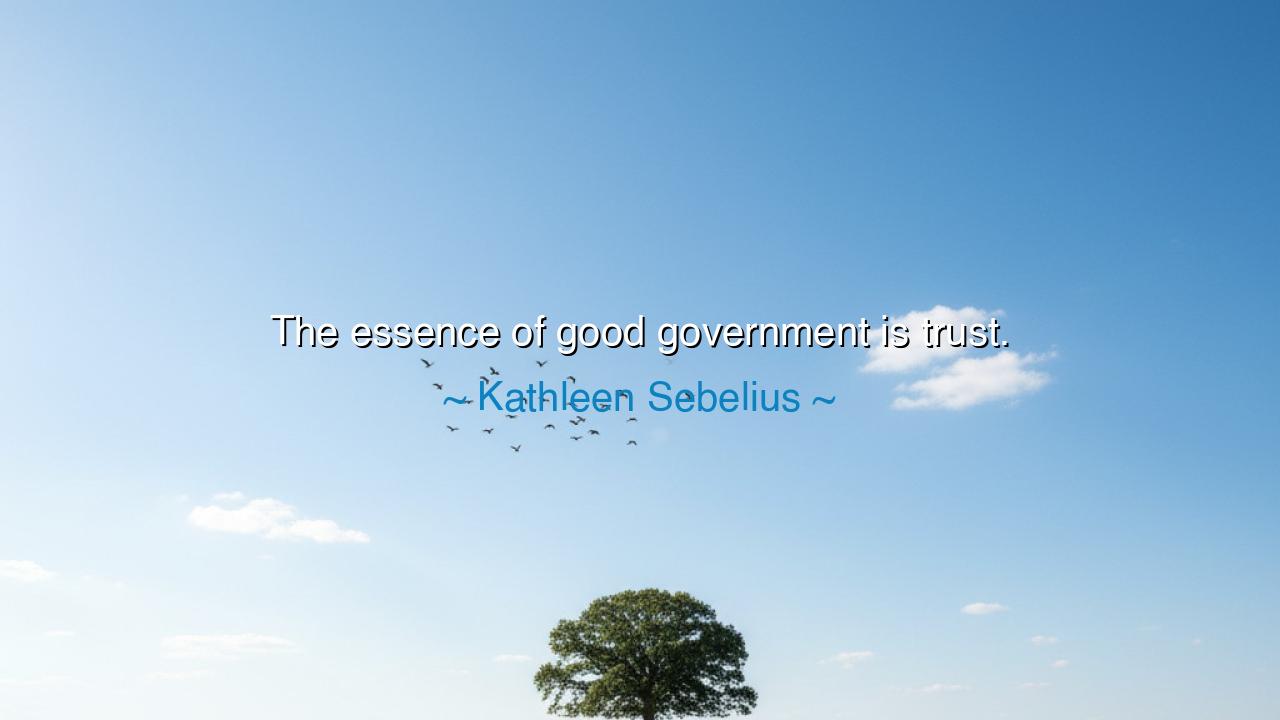
The essence of good government is trust.






“The essence of good government is trust.” — So spoke Kathleen Sebelius, in a time when the bond between ruler and citizen trembled beneath the weight of doubt. Though her words are modern, their wisdom is ancient — for since the dawn of civilization, from the dusty courts of Babylon to the marble halls of Athens, no empire has stood long where trust has failed. A government may command armies, write laws, and build monuments, but if it loses the faith of its people, it becomes an empty shell — powerful in form, hollow in soul.
For trust is the unseen foundation of every free society. It is the sacred covenant between the governors and the governed, between promise and belief. Without it, the voice of leadership becomes mere noise, and the people, weary of deceit, turn either to rebellion or despair. A good government does not rule through fear or manipulation, but through confidence — the quiet strength that arises when citizens believe their leaders act not for gain, but for the common good. Sebelius, a servant of the modern republic, spoke these words not as flattery to power, but as a reminder that authority without trust is tyranny disguised in ceremony.
Look to the great tapestry of history, and you shall see this truth woven again and again. Consider Abraham Lincoln, who led his nation through the crucible of civil war. His government was not beloved by all; it was beset by enemies and burdened by loss. Yet Lincoln, with his steadfast honesty and humble spirit, forged an unbreakable bond with the people. When he spoke, they believed — not because his words were pleasing, but because they were true. He made mistakes, yes, but never betrayed the trust placed in him. And so, even in death, his leadership endured; his example still breathes across the centuries, a testament that trust, once earned, can outlive kings and empires.
But contrast this with the story of the French monarchy before the Revolution. For centuries, the kings of France were seen as chosen by God, their word as sacred as scripture. Yet greed corroded reverence, and deception devoured faith. The peasants were taxed into hunger while the court danced in gold. Promises were made, broken, and forgotten. Thus, the people’s trust — once divine — curdled into rage. The guillotine rose where once the throne had stood, and the kingdom learned too late that when trust is lost, the people’s love turns to fire.
Sebelius’ words, then, are both warning and hope. In an age of division and doubt, where citizens grow cynical and leaders grow distant, the essence of good government still lies not in policy, but in character. For trust is not demanded; it is earned. It is built through transparency, nourished by truth, and destroyed by deceit. A government that listens as much as it speaks, that admits its errors as boldly as it proclaims its victories, becomes a mirror of its people’s virtues. Without that reflection, democracy collapses into noise — laws without loyalty, power without purpose.
And yet, the burden of trust does not fall upon leaders alone. The people, too, must guard their hearts against the poisons of apathy and blind suspicion. For when citizens believe in nothing, even the purest truth sounds false. A healthy society demands both courage in leadership and wisdom in followership. To trust wisely is not to surrender one’s will, but to strengthen the chain that binds liberty to responsibility.
Therefore, let this teaching be engraved upon your hearts: trust is the lifeblood of good government, as faith is the lifeblood of the soul. Do not give it lightly, and do not betray it carelessly. Demand integrity from those who rule you, but offer them fairness in return. Speak truth to power, but listen, too, for truth spoken from power. And when you find leaders who serve with humility and courage, honor them — for they are rare, and the light they bear sustains the whole nation.
For a people without trust are like a ship without anchor, drifting between storm and shore. But a nation built upon it stands firm, not because it is perfect, but because it is united by belief — the belief that though men may fail, their shared duty endures. Remember, then, the words of Sebelius: “The essence of good government is trust.” Guard that essence as you would guard freedom itself, for without it, freedom cannot stand.






AAdministratorAdministrator
Welcome, honored guests. Please leave a comment, we will respond soon